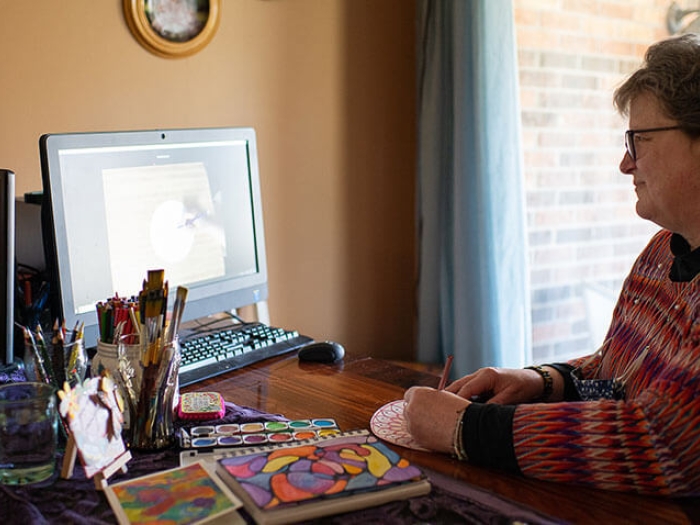Men are just as likely as women to develop lymphedema after cancer surgery. Here’s what guys need to know.
3:13 PM
Author |

An uncomfortable swelling, lymphedema can develop after any surgery that removes or blocks lymph nodes or if radiation damages the superficial lymphatics.
When lymph fluid cannot drain, it collects under the skin and in the soft tissues of the body, making the affected area feel heavy, tight and painful, among other symptoms.
The chronic side effect can affect both women and men, though men sometimes need a push to be proactive.
"There's some extra effort involved in treating or educating men with lymphedema, since an important goal is to reduce the severity of future lymphedema episodes," says Katherine Konosky, an occupational therapy clinical specialist at the University of Michigan.
Does lymphedema treatment differ by gender?
Konosky: There's a stereotype that only women with breast cancer develop lymphedema, but that's not true.
Anatomically, the lymphatic system is not significantly different between men and women. There's no difference between men with lymphedema and women with lymphedema.
Whether by individual appointment or in class, all our lymphedema patients learn about skin care; lymphatic drainage through massage; compression and stretching; and how to manage symptoms at home.
What kinds of cancer surgeries might cause lymphedema?
Konosky: Surgery for prostate cancer is the only one that's gender-specific.
Otherwise, it's the same as for women: treatment for cancers of the head/neck, breast, bladder or kidney, liver or pancreas, parts of the digestive system — really, any cancer treatment in which lymph nodes are removed or the flow of lymphatic fluid has been damaged or blocked.
Can you deduce one's chances of developing lymphedema?
Konosky: It depends on the type of surgery. For example, about 16 percent of melanoma patients develop lymphedema, and roughly 10 percent of genitourinary patients will experience lymphedema.
Patients' individual risk factors might also make them more susceptible. These can include:
-
An extensive surgery
-
Whether the patient had radiation treatment and to what extent the lymph nodes were targeted
-
Whether the wound took more time than usual to heal
-
Whether the tumor was obstructing the lymph system prior to surgery
-
Scarring from the surgery (scar tissue can act as a barrier to the lymph system)
-
A pre-existing condition such as diabetes, thyroid disease or obesity
-
Stress
-
Venous disease in a patient's legs prior to inguinal (groin area) lymph-node removal
Do male patients address a lymphedema diagnosis differently than women?
Konosky: Men seem more concerned about what's going on right now and less concerned about factors affecting the future. I had one male patient who was worried about his leg bandages falling down when he walked, so he duct-taped them in place. That's concern for the present.
In contrast, I don't think I've ever had a male patient say that he typically takes extra care when doing something rough to cover and protect the limb with lymphedema. That would demonstrate concern for the future.
What wellness tips do patients, regardless of gender, need to know?
Konosky: It's important for any lymphedema patient to understand and adopt these elements of self-care:
-
Try to minimize skin or tissue trauma to the involved limb.
-
Set a goal to maintain your ideal body weight.
-
Modify eating habits to lower salt intake and avoid preservatives and artificial sweeteners.
-
Stay hydrated by drinking plenty of water.
-
Aim for an active lifestyle; movement stimulates the lymphatic system.
-
Get screened before starting an exercise or weightlifting program; monitor for swelling or pain and modify the routine if needed.

Explore a variety of health care news & stories by visiting the Health Lab home page for more articles.

Department of Communication at Michigan Medicine
Want top health & research news weekly? Sign up for Health Lab’s newsletters today!





